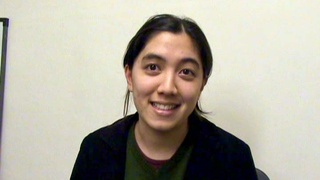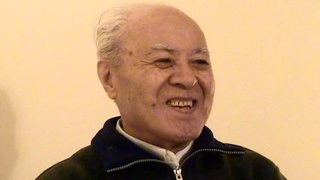Entrevistas
Losing his sister in camp
She got leukemia, a form of leukemia that uh she had to be hospitalized. And it took her a long time for her to die.
The hospital was outside of the camp proper, and uh where you had to go through a fence and guards to get... go to camp. So you couldn't visit. My mother was always there as I recall. And my father was there quite often. So we were left alone, most of the time. And it affected not me more than my younger sister because she never had a mother, you know. So, she blamed it on her sister for...being as a kid that is thinking terms of the jealousy factor, as competition.
But anyways she was um in hospital for a while. There's two things that they reckoned with prolonged her death was that uh she had a blood transfusion there. Just about everybody in that block gave blood, you know. And then the church was praying for her. That was the story I got. So the...my father told them, and mother said, I don't think...I think she's suffering too much so don't pray.
Well my mother never recovered. I'm sure she didn't. My father was um he was a real tough guy. In the sense that he knew what situation he was in. He never really showed this, saw this. He retained his dignity and his strength to not fall apart. And he kept saying now we must go on and all this kind of... You know, it was ganbatte. You know, he was really not um sort of you know in a state that he couldn't reorganize, keep the family together. He kept it together. I know it, I know I, he...he was quite upset...quite angry but it never showed He had to go along with the Japanese tradition. He had to be Nihonjin and not go into... you know fall apart.
So that was what... and then when my sister and broth..died... my..my sister died she was cremated. And then I understand a lot of them were buried too, right. But this is uh..my sister told me this the other day they were buried in a junkyard. You know? And uh in unmarked graves, you know, which they used to do in Germany, you know, with... with the victims, you know.
Fecha: June 29, 2012
Zona: California, US
Entrevista: Chris Komai, John Esaki
País: Watase Media Arts Center, Japanese American National Museum
Explore More Videos

Las condiciones de vida durante su estadía en prisión por haberse resistido al servicio militar (Inglés)
(n. 1925) Recluta disidente

Hablando con los niños sobre mi negativa a alistarme al servicio militar durante la segunda guerra mundial (Inglés)
(n. 1925) Recluta disidente

La decisión de responder "sí-sí" en el cuestionario de lealtad para abandonar el campo de concentración (Inglés)
(n. 1925) Recluta disidente

Reflexionando acerca de la reacción de los japoneses americanos frente al encarcelamiento (Inglés)
(n. 1925) Recluta disidente

Recuerdos de los trabajadores ferroviarios que se hospedaban en el hotel de la familia en Spokane, Washington antes de la guerra (Inglés)
(n. 1923) Especialista en pollos

El despido de trabajadores ferroviarios japoneses americanos después del bombardeo a Pearl Harbor (Inglés)
(n. 1923) Especialista en pollos

Un encuentro racista en un cine después del bombardeo a Pearl Harbor (Inglés)
(n. 1923) Especialista en pollos

Encontrarse con un tren lleno de japoneses americanos que eran transportados a un campo de concentración (Inglés)
(n. 1923) Especialista en pollos

Creciendo con el idioma y los valores japoneses (Inglés)
(1925 - 2018) Educadora Nisei de Hawai





El día que más recuerda en su vida (Japonés)
(n. 1917) Issei en Argentina, originario de Okinawa

El encuentro con su señora (Japonés)
(n. 1917) Issei en Argentina, originario de Okinawa
